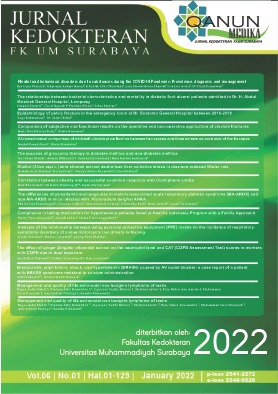Bradycardia, renal failure, shock, and hyperkalemia (BRASH) caused by AV nodal blocker: a case report of a patient with BRASH syndrome resistant to calcium administration
Abstract
Chronic kidney disease patients commonly present in a clinical setting with hypertension may cause or affect the disease. Carvedilol, a beta-blocker that is routinely used to treat hypertension in chronic kidney disease, was proven to be safer compared to other beta-blockers. However, it may still cause AV nodal block. AV nodal block can cause bradyarrhythmia, resulting in low cardiac output and low blood supply to multiple organs, including the kidney. This condition further impaired the kidney function in regulating potassium levels and cause hyperkalemia. Hyperkalemia, in return, can also cause bradycardia, and the vicious cycle goes on and on. Previous studies reported that calcium gluconate administration might significantly improve the patient’s condition. However, in this case, calcium gluconate failed to give significant improvement even though it reduced the potassium level. We report a 53 years old male patient on carvedilol with bradyarrhythmia, chronic kidney disease, shock, and hyperkalemia (BRASH syndrome) that failed to resolve with calcium gluconate administration.
Full text article
References
Aziz, E. F. et al. (2011) ‘Mild hyperkalemia and low eGFR a tedious recipe for cardiac disaster in the elderly : an unusual reversible cause of syncope and heart block’, 6, pp. 41–44.
Bianchi, S. et al. (2019) ‘Management of hyperkalemia in patients with kidney disease : a position paper endorsed by the Italian Society of Nephrology’, Journal of Nephrology, 32(4), pp. 499–516.
Erden, I., Yalcin, S. and Ozhan, H. (2010) ‘Syncope caused by hyperkalemia during use of a combined therapy with the angiotensin-converting enzyme inhibitor and spironolactone’, Kardiol Pol, 68(9), pp. 1043–1045.
Farkas, J. (2016) Bradycardia, Renal failure, AV blocker, Shock, and Hyperkalemia, Pulmcrit (EMCrit). Available at: https://emcrit.org/pulmcrit/brash-syndrome-bradycardiarenal-failure-av-blocker-shock-hyperkalemia/ (Accessed: 8 October 2020).
Farkas, J. D. et al. (2020) ‘BRASH Syndrome: Bradycardia, Renal Failure, AV Blockade, Shock, and Hyperkalemia’, Journal of Emergency Medicine, 59(2), pp. 216–223.
Kidney Disease: Improving Global Outcomes (KDIGO) CKD Work Group (2012) ‘KDIGO Clinical Practice Guideline for the Management of Blood Pressure in Chronic Kidney Disease’,
Kidney International, Supplement, 2, pp. 337–414.
Kusumoto, F. M. et al. (2019) ‘ACC / AHA / HRS GUIDELINE 2018 ACC / AHA / HRS Guideline on the Evaluation and Management of Patients With Bradycardia and Cardiac Conduction Delay’, Circulation, pp. e382–e432.
Lehnhardt, A. and Kemper, M. J. (2011) ‘Pathogenesis , diagnosis and management of hyperkalemia’, pp. 377–384.
Long, B. et al. (2018) ‘Controversies in Management of Hyperkalemia’, Journal of Emergency Medicine. Elsevier Inc, (February), pp. 1–14.
Pugh, D., Gallacher, P. J. and Dhaun, N. (2020) ‘Management of Hypertension in Chronic Kidney Disease’, Drugs. Springer International Publishing, 79(4), pp. 365–379.
Schnaubelt, S. et al. (2020) ‘The BRASH syndrome : an interaction of bradycardia , renal failure , AV block , shock and hyperkalemia’, Internal and Emergency Medicine. pp. 2–4.
Authors

Qanun Medika by FK UM Surabaya is liscence under Lisensi Creative Commons Atribusi 4.0 Internasional.

